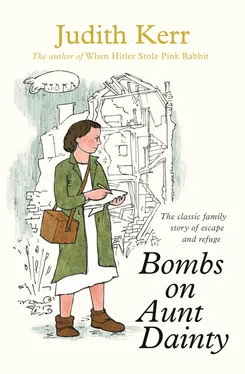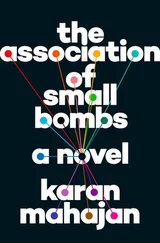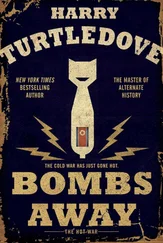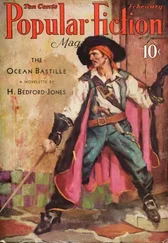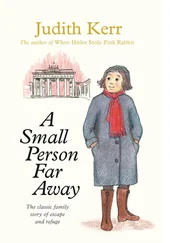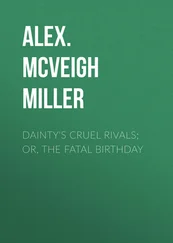She swept the contents back into the bag, took her coat and went out of the room. What am I going to do? she thought, they’ll be waiting for me and I haven’t got my fare.
The landing was dark – the maids must have forgotten to draw back the blackout curtains. Could she borrow from the maids? No, she thought, I can’t. Hoping that, somehow, a miracle would happen, she started down the thickly-carpeted stairs.
In the hall, as she passed what had been the school-room but was now a kind of sitting-room, a friendly American voice called out, “Is that you, Anna? Come in a minute – I haven’t seen you for days.”
Mrs Bartholomew.
Could she ask her?
She opened the door and found Mrs Bartholomew drinking coffee in her dressing gown. She was sitting at the old school-room table and in front of her on the ink-stained surface were a tray and an untidy pile of old children’s books.
“You’re up early on a Sunday,” said Mrs Bartholomew. “Are you off to see your parents?”
Anna thought of answering, “Yes, but I’m afraid I haven’t …” or “Could you possibly lend me …?” Instead, she stood just inside the door and said, “Yes.”
“I bet they’ll be glad to see you.” Mrs Bartholomew waved what appeared to be Hans Andersen. “I’ve been sitting here missing the girls. Judy used to love this book – three, four years ago. Jinny too. It was such fun, wasn’t it, when you all did lessons together!”
Anna reluctantly dragged her mind away from her problem.
“Yes,” she said. It had been fun.
“This war really is crazy,” said Mrs Bartholomew. “Here we all sent our children out of London, thinking that Hitler was going to bomb it out of existence, and a half-year later still nothing at all has happened. Personally, I’m tired of it. I want them back here with me. Jinny says there’s a chance the whole school may move back into town – wouldn’t that be nice?”
“Yes,” said Anna.
“They’d enjoy having you live in the house with them.” Mrs Bartholomew seemed suddenly to notice how Anna was hovering half-in and half-out of the room.
“Well, come in, dear!” she cried. “Have some coffee and tell me – how is everything? How’s the great Polytechnic art course?”
“I really should go,” said Anna, but Mrs Bartholomew insisted, and she found herself sitting at the school-room table with a cup in her hand. Through the window she could see grey clouds and branches waving in the wind. It looked cold. Why couldn’t she have asked for her fare money when she had the chance?
“So what have you been doing? Tell me,” said Mrs Bartholomew.
What had she been doing?
“Well, of course it’s only a junior art course.” It was difficult to bring her mind to bear on it. “We do bits of everything. Last week we all drew each other. I liked doing that.”
The teacher had looked at Anna’s drawing and had told her that she had real talent. She warmed at the memory.
“But of course it’s not very practical – financially, I mean,” she added. The teacher was probably just being nice.
“Now listen!” cried Mrs Bartholomew. “You don’t have to worry about finance at your age. Not while you’re in this house. I know it’s difficult for your parents being in a strange country and everything, but we love having you and you can stay just as long as you like. So you just concentrate on your education. I’m sure you’ll do very, very well, and you must write and tell the girls all about it because they’d love to hear.”
“Yes,” said Anna. “Thank you.”
Mrs Bartholomew looked at her. “Are you all right?” she asked.
“Yes,” said Anna. “Yes, of course. But I think I should go.”
Mrs Bartholomew walked with her into the hall and watched her put on her coat.
“Wait a minute!” she cried, diving into a cupboard, to emerge a moment later with something thick and grey. “You’d better wear Jinny’s scarf.”
She made Anna wind it round her neck and then kissed her on the cheek.
“There!” she said. “Are you sure you’ve got everything you need? Nothing you want?”
Now, surely, was the moment to ask. It would be so simple, and she knew Mrs Bartholomew wouldn’t mind. But standing there in Judy’s shoes and Jinny’s scarf and looking at Mrs Bartholomew’s kind face she found it suddenly impossible. She shook her head and smiled. Mrs Bartholomew smiled back and closed the door.
Damn! thought Anna as she started to trudge up Holland Park Avenue. Now she would have to walk all the way to Bloomsbury because she didn’t have fourpence for the tube.
It was a cold, bright day, and at first she tried to think of it as an adventure.
“I really like exercise,” she said experimentally to Miss Metcalfe in her mind, “as long as it isn’t lacrosse.” But, as usual, she could not extract a satisfactory reply, so she abandoned the conversation.
A few people were still in bed as it was Sunday and you could see their blackout curtains drawn above the shuttered shops. Only the paper shop at Notting Hill Gate was open, with Sunday papers displayed on racks outside and printed posters saying “Latest War News” but, as usual, nothing had happened. The pawnbroker next to the tube station still had the sign which had so much puzzled Anna when she had first come to London and couldn’t speak English properly. It said “Turn Your Old Gold Into Cash”, but a little piece had fallen off the G in Gold, turning it into Cold. Anna remembered how every day, when she had passed it on her way to do lessons with Jinny and Judy, she had wondered what it meant and whether, if she went into the shop and sneezed, they would give her some money.
Of course nowadays no one talking to Anna would guess that she hadn’t spoken English from birth, and she had lost the American accent she had originally picked up from the Bartholomews. She hadn’t been meant just to learn English from them – they had also been meant to learn some of her native German and the French she had acquired in Paris after escaping from Hitler. But it hadn’t worked out like that. She and Jinny and Judy had become friends and spoken English, and Mrs Bartholomew hadn’t minded.
There was a sharp wind blowing across Kensington Gardens. It rattled the signs pointing to air-raid shelters which no one had ever used and the few crocuses still growing between newly-dug trenches looked frozen. Anna pushed her hands deep into the pockets of her old grey coat. Really, she thought, it was ridiculous for her to be walking like this. She was cold, and she would be late, and Mama would wonder where she’d got to. It was ridiculous being so short of money that the loss of fourpence threw everything out of gear. And how could anyone be so stupidly shy as not to be able to borrow fourpence when they needed it? And how had she managed to lose the money, anyway – she was sure she’d had it the previous day, a silver threepenny bit and two halfpennies, she could see them now. I’m sick of it, she thought, I’m sick of being so ineffectual – and Miss Metcalfe’s tall figure rose unbidden before her, cocked a sarcastic eyebrow and said, “Poor Anna!”
Oxford Street was deserted, the windows of the big stores covered in criss-crossings of brown paper to stop them splintering in case of air raids, but Lyons Corner House was open and filled with soldiers queuing for cups of tea. At Oxford Circus the sun came out and Anna felt more cheerful. After all, the reason for her predicament was not only that she was shy. Papa would understand why she couldn’t borrow money from Mrs Bartholomew, not even such a small sum. Her feet were tired, but she was two thirds of the way home and perhaps she was really doing something rather splendid.
“Once,” said a grown-up Anna negligently to an immensely aged Miss Metcalfe. “Once I walked all the way from Holland Park to Bloomsbury rather than borrow fourpence,” and the aged Miss Metcalfe was suitably impressed.
Читать дальше
